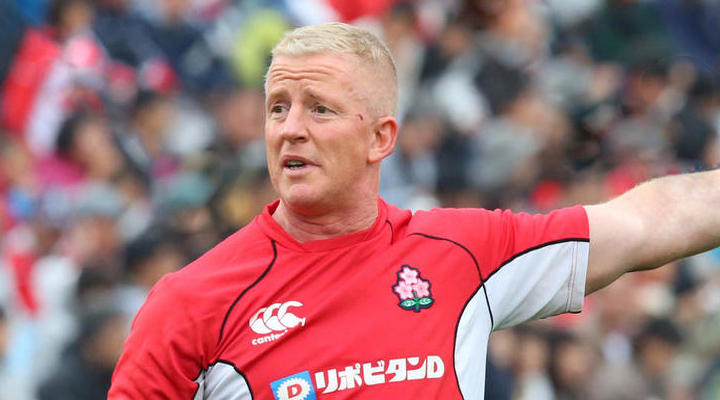An internationally recognized biomechanist and strength and conditioning coach, John Pryor, rugby training expert, has worked in the highest levels of international sport and is responsible for a number of advanced training methodologies now being used across the sport of rugby. Mr. Pryor’s expertise has proven to be highly beneficial in his many professional endeavors, including in his role as the director of JointAction as well as his responsibilities as the strength and conditioning coordinator with the Japan Rugby Football Union.
Mr. Pryor’s work in his varied fields of expertise has been widely hailed as innovative, and he has been recognized for his impressive work with the Japan Rugby Football Union, with his training philosophies clearly influencing the team’s success at the international level. Through the application of his own training experience as a track & field athlete along with the years of research he conducted while earning a Master of Health Science in biomechanics from Southern Cross University, Mr. Pryor has developed a unique training program that brings a great deal of specificity to a sport known for its athletic complexity.
Before beginning his work with Japan’s national team in 2012, John Pryor worked with Australia’s national team as a coach and as a consultant for three years from 2004 to 2007. Following this experience, Mr. Pryor took on his current position as the director of JointAction and continues to conduct the kind of research that enables him to develop and implement new and innovative training methodologies for athletes competing at the highest levels of sport, as well as regular working people.
How did you get started? What inspired you to start this business?
I have been fascinated with training methodologies ever since I began to understand the role of biomechanics in separating athletes in track and field events like the sprints and the throws, so I knew I wanted to be involved in helping athletes get the most out of their training by developing a highly specialized approach.
How do you make money?
I have a variety of different professional responsibilities, and each role offers a more than fair compensation package. I also offer consulting services both in professional sports and in occupational health and safety.
How long did it take for you to become profitable?
It took some time for industries outside of sport to recognize the value of injury prevention, so we had to make a concerted effort to educate others on the importance of preventing musculoskeletal injuries before we were able to achieve a stable level of profitability.
When you were starting out, was there ever a time you doubted it would work? If so, how did you handle that?
As an athlete who has been absorbed in continuing education and research for many years, I felt quite confident that we were headed in the right direction even when others may have felt the situation appeared to be a bit bleak. I believe that if you are passionate and have good ideas and product, you will eventually succeed.
How did you get your first customer?
Our first major engagement came from a very forward thinking CEO of a large physical workforce. He was an innovator, and was influenced by his life-long commitment to martial arts. He saw the value of our work immediately.
What is one marketing strategy (other than referrals) that you’re using that works really well to generate new business?
Given our surprising (though only to outside observers) success in the World Cup, my work with the national team in Japan and my experience with Australia’s national team has helped for recognition purposes. It gets people’s attention, but its only a starting point. We need to produce the goods.
What is the toughest decision you’ve had to make in the last few months?
Athletes at the highest levels often present interesting challenges, so I often find it difficult to convince an athlete to scale back their training when they want to push themselves harder. There is a fine line between the psychological edge that might be gained and the risk of reducing the physiological benefit of the training session, so it is never an easy decision and it is not always a simple task to convince an athlete to ease up.
What do you think it is that makes you successful?
I am passionate about the combination of research, good thinking and empirical practise. I love paying attention to the smallest of details when it comes to training. And, above all I am a great listener and have access to some great mentors and thinkers.
What has been your most satisfying moment in business?
Seeing our team succeed at the World Cup in a way that no one outside of the team expected was incredibly satisfying on so many levels.
What does the future hold for your business? What are you most excited about?
I love working with athletes and I am always excited to help them achieve their goals in any way I can. I hope that in the future we will remain on the cutting edge of innovation and will continue to reap the reward of our hard work. I want to se some of the developments in sport help everyday people experience better health at work and in their everyday life.
How do you balance all of your professional responsibilities?
I don’t really view what I do as work, as I would literally do what I do even if I didn’t get paid for it. Even though it seems like I am very busy all the time, I can’t even begin to imagine spending my days doing anything else. My wife complains that I don’t know how not to work. She is right, to a large extent.

